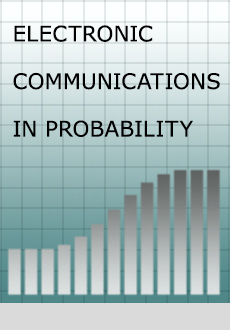Abstract
We consider a first-passage percolation (FPP) model on a Delaunay triangulation $\mathcal{D}$ of the plane. In this model each edge $\mathbf{e}$ of $\mathcal{D}$ is independently equipped with a nonnegative random variable $\tau_\mathbf{e}$, with distribution function $\mathbb{F}$, which is interpreted as the time it takes to traverse the edge. Vahidi-Asl and Wierman [9] have shown that, under a suitable moment condition on $\mathbb{F}$, the minimum time taken to reach a point $\mathbf{x}$ from the origin $\mathbf{0}$ is asymptotically $\mu(\mathbb{F})|\mathbf{x}|$, where $\mu(\mathbb{F})$ is a nonnegative finite constant. However the exact value of the time constant $\mu(\mathbb{F})$ still a fundamental problem in percolation theory. Here we prove that if $\mathbb{F}(0)<1-p_c^*$ then $\mu(\mathbb{F})>0$, where $p_c^*$ is a critical probability for bond percolation on the dual graph $\mathcal{D}^*$.
Citation
Leandro Pimentel. "The time constant and critical probabilities in percolation models." Electron. Commun. Probab. 11 160 - 167, 2006. https://doi.org/10.1214/ECP.v11-1210
Information





